小学英语教科版(广州)五年级上册 Module 4 Past experiences 练习课件(共45张PPT)
文档属性
| 名称 | 小学英语教科版(广州)五年级上册 Module 4 Past experiences 练习课件(共45张PPT) |
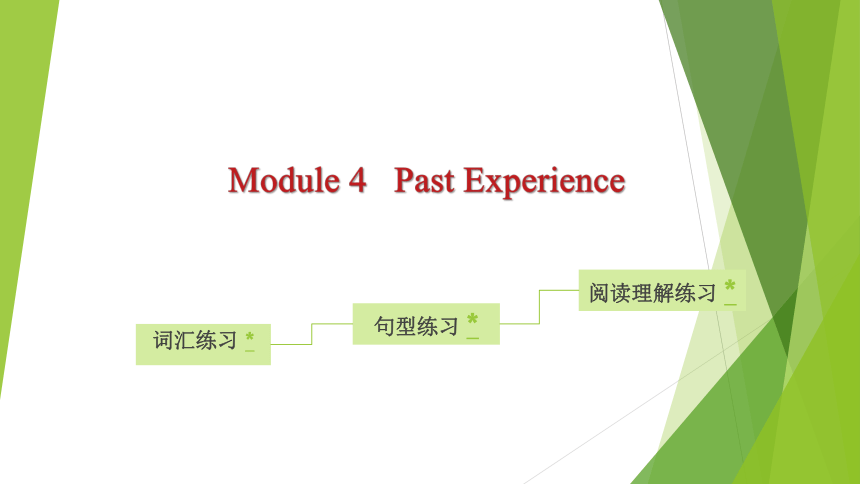
|
|
| 格式 | zip | ||
| 文件大小 | 10.1MB | ||
| 资源类型 | 教案 | ||
| 版本资源 | 教科版(广州) | ||
| 科目 | 英语 | ||
| 更新时间 | 2020-01-21 00:00:00 | ||
图片预览

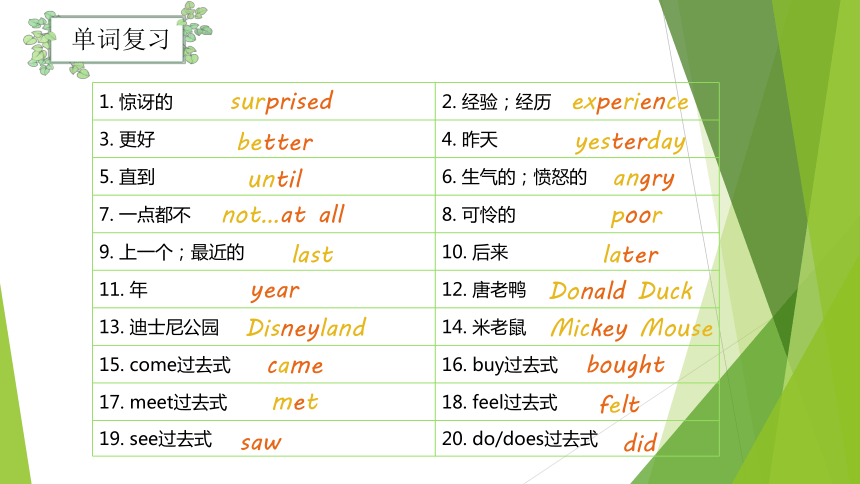
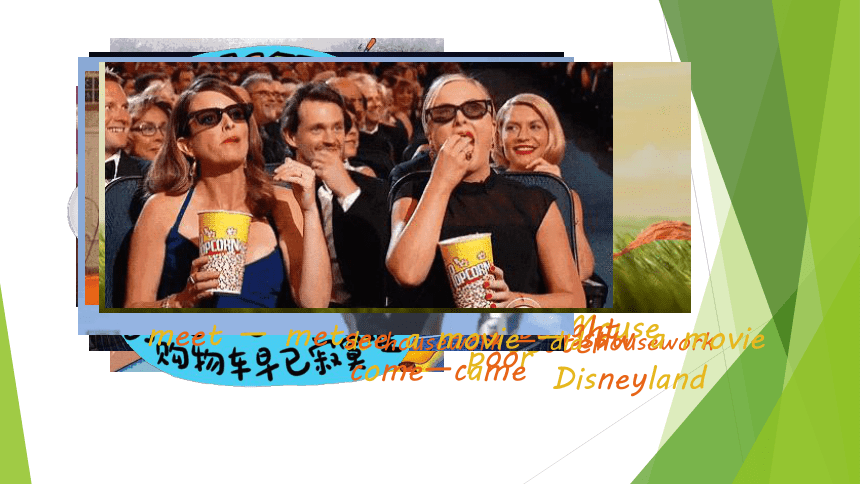
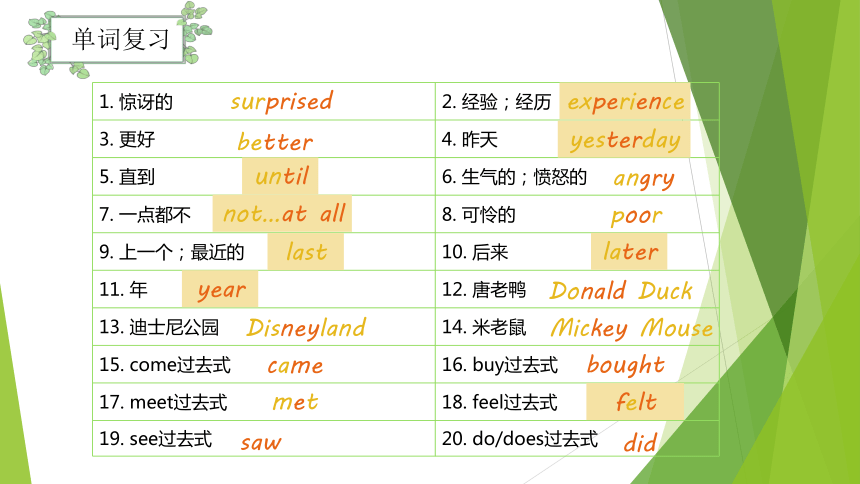
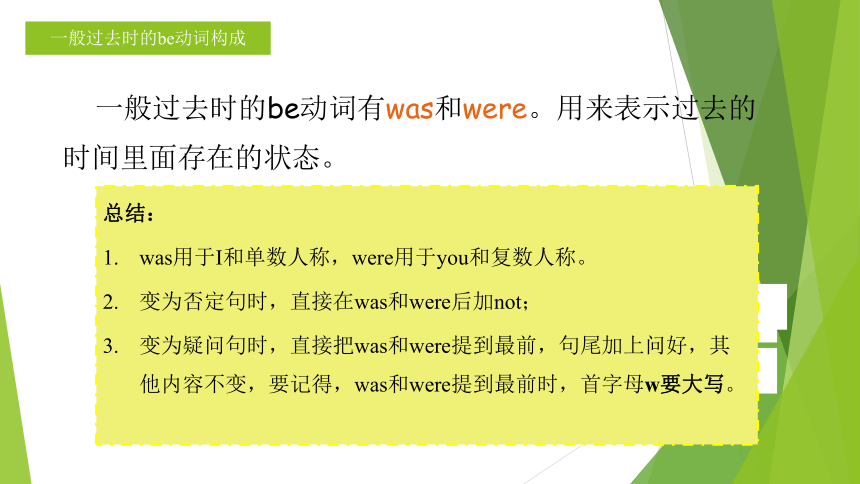

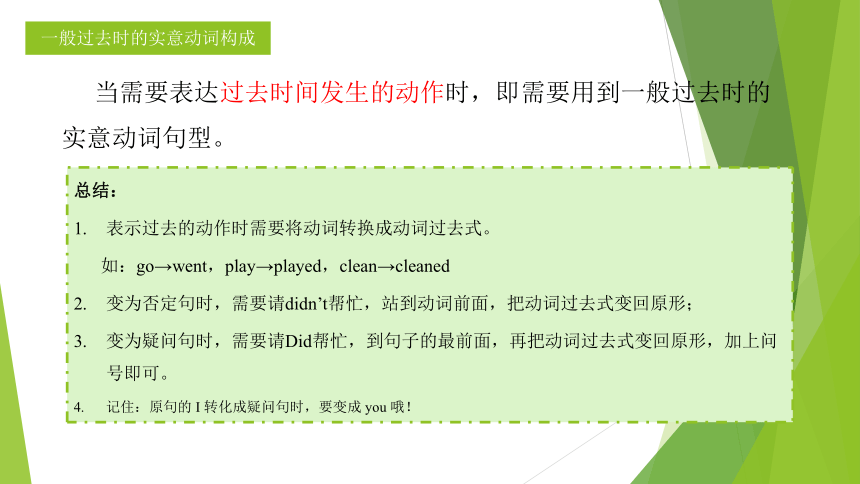
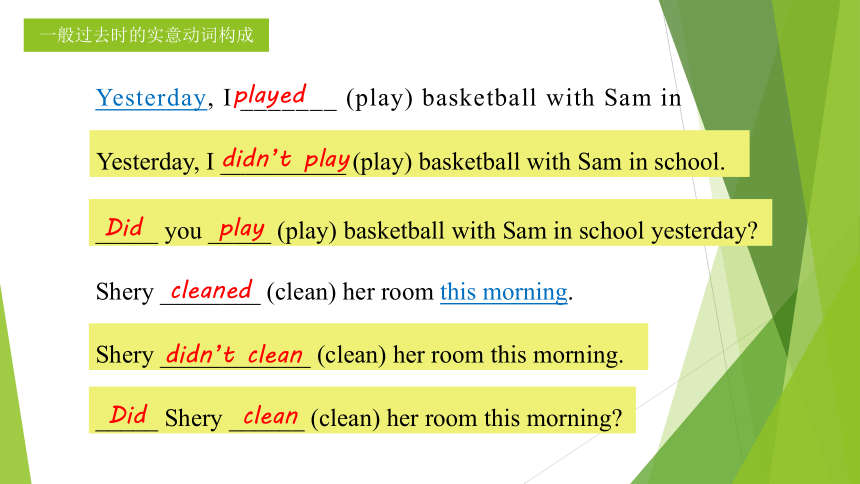
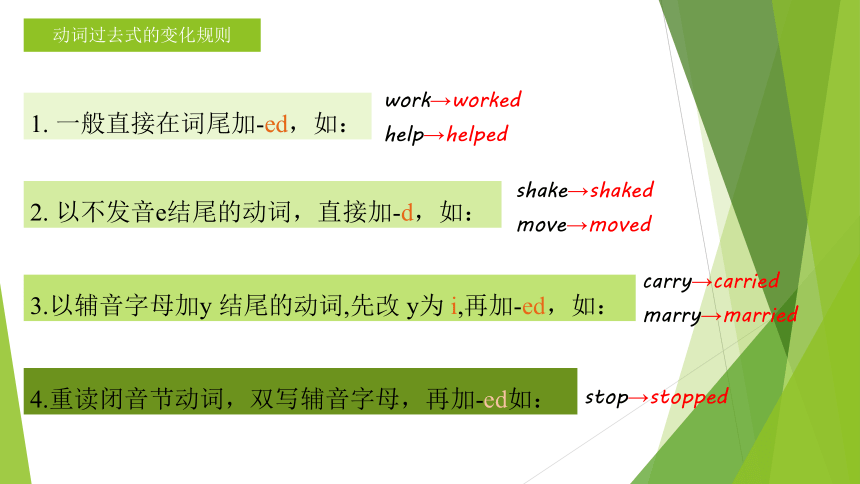
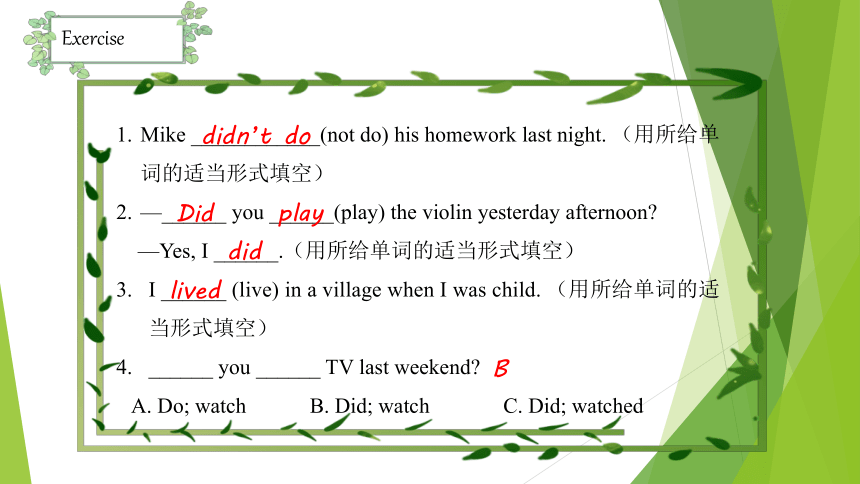
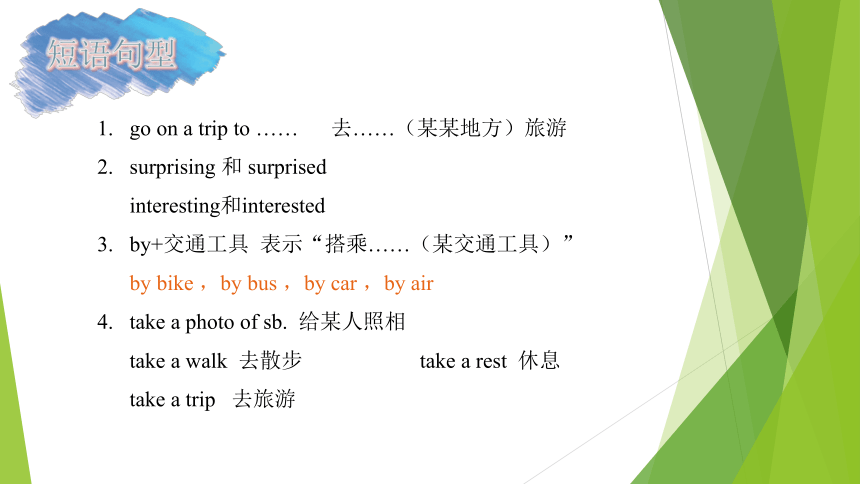
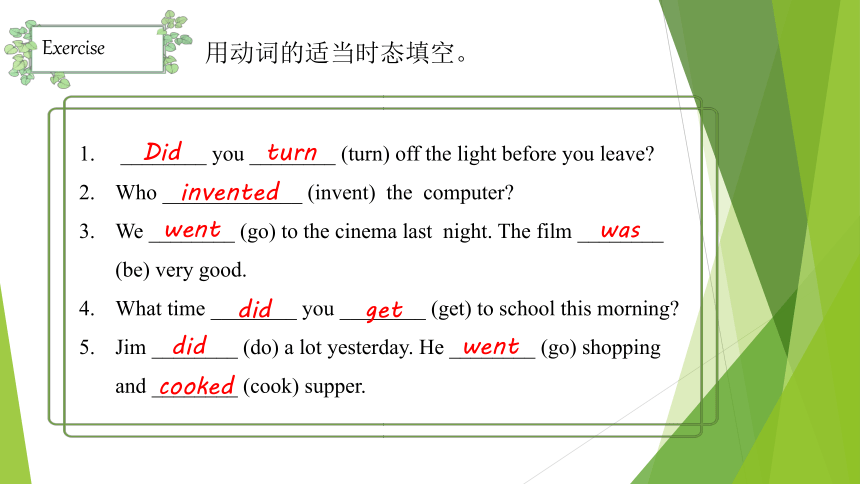
文档简介
(共45张PPT)
Module 4 Past Experience
词汇练习 *
句型练习 *
阅读理解练习 *
1. 惊讶的 2. 经验;经历
3. 更好 4. 昨天
5. 直到 6. 生气的;愤怒的
7. 一点都不 8. 可怜的
9. 上一个;最近的 10. 后来
11. 年 12. 唐老鸭
13. 迪士尼公园 14. 米老鼠
15. come过去式 16. buy过去式
17. meet过去式 18. feel过去式
19. see过去式 20. do/does过去式
单词复习
surprised
experience
better
until
angry
not…at all
poor
last
later
year
Donald Duck
Disneyland
Mickey Mouse
came
bought
met
felt
saw
did
yesterday
surprised
good
better
angry
poor
Donald Duck and Mickey Mouse
Disneyland
buy-bought
come—came
do housework — did housework
meet — met
see a movie — saw a movie
1. 惊讶的 2. 经验;经历
3. 更好 4. 昨天
5. 直到 6. 生气的;愤怒的
7. 一点都不 8. 可怜的
9. 上一个;最近的 10. 后来
11. 年 12. 唐老鸭
13. 迪士尼公园 14. 米老鼠
15. come过去式 16. buy过去式
17. meet过去式 18. feel过去式
19. see过去式 20. do/does过去式
单词复习
surprised
experience
better
until
angry
not…at all
poor
last
later
year
Donald Duck
Disneyland
Mickey Mouse
came
bought
met
felt
saw
did
yesterday
一般过去时的be动词构成
I ______ 15 years old last year.
They _______ in Shanghai last month.
一般过去时的be动词有was和were。用来表示过去的时间里面存在的状态。
如:
Yesterday _______ Children’s Day.
was
was
were
否定句:I wasn’t 15 years old last year.
疑问句: Were you 15 years old last year?
否定句:Yesterday wasn’t Children’s Day.
疑问句:Was yesterday Children’s Day?
否定句:They weren’t in Shanghai last month.
疑问句:Were they in Shanghai last month?
总结:
was用于I和单数人称,were用于you和复数人称。
变为否定句时,直接在was和were后加not;
变为疑问句时,直接把was和were提到最前,句尾加上问好,其他内容不变,要记得,was和were提到最前时,首字母w要大写。
Exercise
There _________ (be) a big cow on the farm last year.(用所给单词的适当形式填空)
Where _________ (be) you last night?(用所给单词的适当形式填空)
My friends _________ (not be) in Beijing, they _________ (be) in Shanghai now. (用所给单词的适当形式填空)
My last weekend was very interesting.(对划线句子提问)
_____________________________________________________
was
were
aren’t
are
How was your last weekend?
一般过去时的实意动词构成
当需要表达过去时间发生的动作时,即需要用到一般过去时的实意动词句型。
如:
Ben and I _______ (go) shopping in Hongkong last weekend.
Yesterday, I _______ (play) basketball with Sam in school.
Shery ________ (clean) her room this morning.
went
played
cleaned
Did you and Ben go shopping in Hongkong last weekend?
Ben and I ________ (go) shopping in Hongkong last weekend.
didn’t go
总结:
表示过去的动作时需要将动词转换成动词过去式。
如:go→went,play→played,clean→cleaned
变为否定句时,需要请didn’t帮忙,站到动词前面,把动词过去式变回原形;
变为疑问句时,需要请Did帮忙,到句子的最前面,再把动词过去式变回原形,加上问号即可。
记住:原句的 I 转化成疑问句时,要变成 you 哦!
一般过去时的实意动词构成
Yesterday, I _______ (play) basketball with Sam in school.
Shery ________ (clean) her room this morning.
played
cleaned
Yesterday, I __________ (play) basketball with Sam in school.
didn’t play
_____ you _____ (play) basketball with Sam in school yesterday?
Did
play
Shery ____________ (clean) her room this morning.
didn’t clean
_____ Shery ______ (clean) her room this morning?
Did
clean
动词过去式的变化规则
1. 一般直接在词尾加-ed,如:
2. 以不发音e结尾的动词,直接加-d,如:
3.以辅音字母加y 结尾的动词,先改 y为 i,再加-ed,如:
4.重读闭音节动词,双写辅音字母,再加-ed如:
work→worked
help→helped
shake→shaked
move→moved
carry→carried
marry→married
stop→stopped
Exercise
Mike ____________(not do) his homework last night. (用所给单词的适当形式填空)
—______ you ______(play) the violin yesterday afternoon?
—Yes, I ______.(用所给单词的适当形式填空)
I ______ (live) in a village when I was child. (用所给单词的适当形式填空)
______ you ______ TV last weekend?
A. Do; watch B. Did; watch C. Did; watched
didn’t do
Did
play
did
lived
B
短语句型
go on a trip to …… 去……(某某地方)旅游
surprising 和 surprised
interesting和interested
by+交通工具 表示“搭乘……(某交通工具)”
by bike ,by bus ,by car ,by air
4. take a photo of sb. 给某人照相
take a walk 去散步 take a rest 休息
take a trip 去旅游
________ you ________ (turn) off the light before you leave?
Who _____________ (invent) the computer?
We ________ (go) to the cinema last night. The film ________ (be) very good.
What time ________ you ________ (get) to school this morning?
Jim ________ (do) a lot yesterday. He ________ (go) shopping and ________ (cook) supper.
用动词的适当时态填空。
Exercise
Did
turn
invented
went
was
did
get
did
went
cooked
Lucy did her homework at home. (改否定句)
Lucy _______ _______ her homework at home.
2. He found some meat in the fridge. (变一般疑问句)
_______ he _______ _______ meat in the fridge?
She stayed there for a week. (对划线部分提问)
_______ _______ _______ she _______ there?
4. There was some orange in the cup. (变一般疑问句)
_______ there _______ orange in the cup?
Exercise
按要求转换句式。
didn’t do
Did find any
How long did stay
Was any
Yesterday was Children’s Day. Tell me, children, what did you do?
They look great. I played basketball at the park. It was so much fun. But my mom was angry because I came home late.
And you Ben? Where did you go yesterday?
I stayed at home all day . In the morning I cleaned my room and in the afternoon I did my homework. It was no fun at all.
Poor man!
I went shopping with my mother, I bought a new pair of sports shoes. Do you like them?
What did you do yesterday?
Ms White:
Jiamin:
Xiaoling:
Ms White:
Ben:
All:
① What did you do yesterday? 你昨天去做了什么?
回答:I did my homework yesterday.
回答:I played basketball in school.
②变化: 晓玲昨天去做了什么?
What did Xiaoling do yesterday?
③变化: 晓玲昨天去了哪里?
Where did Xiaoling go yesterday?
回答:Xiaoling did her homework yesterday.
回答:Xiaoling played basketball in school.
回答:Xiaoling went to Hongkong yesterday.
回答:Xiaoling stayed at home yesterday.
④poor 可怜的;不幸的;贫穷的 <反义词> rich 富有的
例子:This is a poor family, they don’t have any money to buy food.
例子:Poor boy, he must be very sad.
⑤固定搭配词组:
go shopping → went shopping
play basketball→ played basketball
stay at home→ stayed at home
clean my room → cleaned my room
do my homwork→ did my homework
根据短文内容,选择正确答案。
Tianhe is a young district in Guangzhou. It has a history of only 34 years.
Thirty years ago, you could see fields here and there in Tianhe. There were only a few tall buildings, shopping centres and theatres. Most of the people in Tianhe needed to go to Beijing Road or Xiaxiajiu Road in Yuexiu to have fun.
But Tianhe is growing very fast. Now, Tianhe is very modern. There are many interesting places here. You can go shopping in the shopping centres or supermarkets, play sports in Tianhe Sports Centre. If you want to take beautiful photos, Tianhe Park and Huacheng Square(花城市场) are the good places for you. If you are tired, you may see films in the modern and comfortable theatres or take a double-decker bus(双层巴士) to travel around Tianhe. I’m sure you will enjoy the life in Tianhe.
( ) 1. Tianhe was founded in _________.
A. 1975 B. 1985 C. 1995
( )2. You could see lots of _________ in Tianhe 30 years ago.
A. tall buildings B. fields C. theatres
( )3. Tianhe Park and Huacheng Square are the good places for you to __________.
A. go shopping B. see films C. take photos
B
B
C
A trip to Hongkong
Dear Diary,
Last weekend my mother, Ben and I went on a trip to Hongkong. We travelled there by train and stayed with my cousin. Ben said he was very excited because it was his first visit to the island. On our first day my cousin took us to Disneyland. We took a photo with Mickey Mouse and Donald Duck and played lots of different games. We had hamburgers and chips for lunch. I think I ate a little too much because later I felt ill. Ben sat with me until I felt better. He was so kind. The next day we went shopping. When we were on the street, we met Xiaoling and her mum. I was very surprised because I didn’t know they came to Hongkong, too. We all had lunch together and talked about our trip.
① go on a trip to XXX 去某地旅行 = travel to XXX
例子:I went on a trip to Beijing last month.
② by+交通工具 乘坐某交通工具
例子:—How did you go to school every day?
常用:by bike, by car, by bus, by train(坐火车), by underground(坐地铁)
by air/plane(坐飞机)
= I travelled to Beijing last month.
—I go to school by bike every day, but yesterday I went to school by bus.
③ take a photo with XX 和某人/某物一起照相 = take photos with
例子:I took a photo with pandas in the zoo yesterday.
④ 连词:because(因为) so(所以) and(和) until(直到) but(但是)
☆because和so不可以出现在同一个句子中。
例子:I would like to take photos with my brother tomorrow.
例子:I don’t like ice cream because I think it’s too sweet.
例子:It’s a sunny day, so I will go to a park to have a picnic.
例子:I didn’t go to bed until my mother came home.
例子:I like pandas very much but I don’t like bears at all.
阅读短文,判断句子是否符合短文内容,如符合请写“T”,否则写“F”。
How time flies. I’m in Year Six now. I’ve changed a lot in six years.
First, I’ve grown a lot. I’m taller and stronger. I run faster, and I am taller than when I was young. When I started school, I was not good at any sports, now I play badminton quite well.
Secondly, I’ve learned a lot. For example I knew only a few English words six years ago, but now I can read and write stories in English. The bad thing is that I used to have good eyesight(视力), but now I have to wear glasses.
Thirdly, I’m more outgoing and have more friends. I used to be shy. Now my classmates think I’m an interesting boy, and they enjoy being my friends. I used to go out with my parents on weekends and during holidays, now I prefer to be with my school friends. Last winter, I travelled to Beijing with my friends!
In a word, I’ve grown up a lot. I can do a lot now, and I’m ready to do more!
( ) 1. The boy is good at table tennis.
( ) 2. The boy didn’t know much English when he started school.
( ) 3. The boy is shy now, he has no friends.
( ) 4. Most of the classmates enjoy being the boy’s friends.
( ) 5. Last winter, the boy travelled to Shenzhen with his friends.
F
T
F
T
F
Dear Diary,
Last week ,I went to Macau with my mother. It was an interesting trip. First, we went shopping in the supermarket. And then, we had lunch at restaurant. It was delicious, I like it vert much. After lunch, we went to Senado Square. Finally, we went back home by train.
I ___ 12 years old this year.
我去年11岁.
I ____ 11 years old last year.
He ____ in Beijing now.
他昨天在上海。
He ____ in Shanghai yesterday.
他现在在北京。
Please look at the sentences
我今年12岁.
am
was
is
was
They ____ in China today.
他们今天在中国。
They ____ in Japan yesterday.
他们昨天在日本。
are
were
am/ is
was
are
were
每天,早餐我吃鸡蛋和牛奶。
I ____ eggs and milk for breakfast every morning.
昨天,早餐我吃面条。
I ____ noodles for breakfast yesterday morning.
他每天都吃水果。
He _____ fruit every day.
昨天他吃了3个苹果。
He _____ 3 apples yesterday.
have/ has
had
have
has
had
had
I get up at 6:30 every morning.
I ___ up at 9:00 last Sunday.
He plays football every afternoon.
He _____ basketball yesterday afternoon.
He does his homework every evening.
He ____ some reading last night.
动词原形、第三人称单数
动词过去式
got
played
did
谓语构成
1.动词 be
2.动词 have, has
3.助动词do, does
4.行为动词用过去式
was , were
had
did
一般过去时以动词的过去式来表示,没有人称和数的变化.(was,were除外)
I went to school yesterday.
They went to school yesterday.
一般过去时的谓语构成:由动词的过去式构成
规则变化
1.一般加ed
2.以e结尾加d
3.末尾只有一个辅音字母的重读闭音节词,先双写这个辅音字母,再加ed .
work —
worked
change —
changed
shop —
shopped
stop —
stopped
move—
moved
nod
4.以辅音字母加y 结尾的词,先改 y为 i,再加ed
study —
studied
5.不规则变化.(见不规则动词表P102)
carry—
carried
hurry
marry
规则动词过去式-ed的发音
1.在以清辅音结尾的规则动词后,
-ed读作/ t /
work
/w3:k/
ed
t/
2.在以浊辅音或元音结尾的规则动词后,
-ed读作/d /
play
/pleI /
live
/lIv /
ed
d/
ed
d/
3.在以/t/或/d/结尾的规则动词后,
-ed读作/Id /
visit
/’vIzIt /
ed
Id/
finished
enjoyed
shouted
moved
helped
wanted
called
needed
/t/
/d/
/Id/
/d/
/d/
/t/
/Id/
/Id/
Let’s read them
1.与ago 连用:
a moment
two minutes
three hours
five days
one week
six months
four years
ago
用于一般过去时的时间状语
long long ago
last
time
night
week
month
term
Monday
yesterday
morning
afternoon
evening
the day before yesterday
2.与last 连用
3.与yesterday 连用:
4.与that 连用:
that
morning
winter
day
year
just now
in the old days
in those days
in 1980
at that time
once upon a time
5.其他时间状语:
1.肯定句:主语 +行为动词过去式
be动词过去式(was / were)
e.g.We played football yesterday.
I was in the office last night.
He couldn’t swim 10 years ago.
2.否定句 did not / didn’t + 行为动词原形
was not / wasn’t + 其他成分
were not / weren’t + 其他成分
e.g. I was not in the office last night.
I didn't sing a song at Kangkang's party.
I didn't play video games.
3. 一般疑问句
did + 主语 +行为动词原形
was / were + 主语 +其他成分
eg. - Did you go shopping yesterday?
-Yes, I did. / No, I didn’t.
-Was she 15 years old last year?
4. 特殊疑问句
特殊疑问词 +did + 主语 +行为动词原形
特殊疑问词 +was / were + 主语 +其他成分
eg. Where did you go shopping yesterday?
When and where were you born?
行为动词一般过去时的否定式
一般过去时的否定式是在动词原形前加助动词did not (didn’t).
主语+didn’t+动词原形
I _________ them the news.
I ____ (tell) them the news yesterday.
didn’t tell
told
行为动词一般过去时的疑问式
一般过去时的一般疑问式在句首加助动词did
Did+主语+动词原形……?
They ______(finish) their work at four.
一般疑问句:
____ they _____ their work at four?
Yes, they _____. No, they _____.
finished
Did
finish
did
didn’t
行为动词一般过去时的疑问式
一般过去时的特殊疑问式
疑问词+did+主语+动词原形……?
They finished their work at four.
A
B
对划线部分提问
A:
B:
What did they do at four?
When did they finish their work?
T
注意
1. 加助动词did或者didn’t后,动词
须返回原形。Choose F or T.
Did he went to school yesterday?
Did he go to school yesterday?
F
2.They didn’t finish their homework last night.
They didn’t finished their homework last night.
T
F
巧记不规则动词过去式
1.中间去e,末尾加t??? 如:
keep→kept, feel→felt,
sleep→slept,sweep→swept
2.结尾d变t??? 如:
build→built,lend→lent,
send→sent,spend→spent
3.遇见i改为a ??如:
ring→rang,sit→sat, drink→drank,
sing→sang,swim→swam,begin→began,
give→gave
4.“骑(马)”“开(车)”“写(字)”——把i变o如:ride→rode,drive→drove,write→wrote
5.“想”“买”“带来”“打仗”——ought换上
??? think→thought,buy→bought,
bring→brought,fight→fought
6.“教书”“抓住”——aught切莫忘 如:
??? teach→taught,catch→caught
7.ow/aw改为ew是新时尚 如:
??? know→knew,grow→grew,
throw→threw,draw→drew
8.“放”“让”“读”过去式与原形一样 如:
? put→put,let→let,read→read/red
Exercises
1.I ____ the number down on a piece of paper a moment ago.
A. write B. writed
C. wrote D. writing
2. Everything ___ ready before Father came.
A. were B. was
C. is D. are
C
B
3.He always _____me last term.
A. helped B. helps
C. helping D. help
A
Module 4 Past Experience
词汇练习 *
句型练习 *
阅读理解练习 *
1. 惊讶的 2. 经验;经历
3. 更好 4. 昨天
5. 直到 6. 生气的;愤怒的
7. 一点都不 8. 可怜的
9. 上一个;最近的 10. 后来
11. 年 12. 唐老鸭
13. 迪士尼公园 14. 米老鼠
15. come过去式 16. buy过去式
17. meet过去式 18. feel过去式
19. see过去式 20. do/does过去式
单词复习
surprised
experience
better
until
angry
not…at all
poor
last
later
year
Donald Duck
Disneyland
Mickey Mouse
came
bought
met
felt
saw
did
yesterday
surprised
good
better
angry
poor
Donald Duck and Mickey Mouse
Disneyland
buy-bought
come—came
do housework — did housework
meet — met
see a movie — saw a movie
1. 惊讶的 2. 经验;经历
3. 更好 4. 昨天
5. 直到 6. 生气的;愤怒的
7. 一点都不 8. 可怜的
9. 上一个;最近的 10. 后来
11. 年 12. 唐老鸭
13. 迪士尼公园 14. 米老鼠
15. come过去式 16. buy过去式
17. meet过去式 18. feel过去式
19. see过去式 20. do/does过去式
单词复习
surprised
experience
better
until
angry
not…at all
poor
last
later
year
Donald Duck
Disneyland
Mickey Mouse
came
bought
met
felt
saw
did
yesterday
一般过去时的be动词构成
I ______ 15 years old last year.
They _______ in Shanghai last month.
一般过去时的be动词有was和were。用来表示过去的时间里面存在的状态。
如:
Yesterday _______ Children’s Day.
was
was
were
否定句:I wasn’t 15 years old last year.
疑问句: Were you 15 years old last year?
否定句:Yesterday wasn’t Children’s Day.
疑问句:Was yesterday Children’s Day?
否定句:They weren’t in Shanghai last month.
疑问句:Were they in Shanghai last month?
总结:
was用于I和单数人称,were用于you和复数人称。
变为否定句时,直接在was和were后加not;
变为疑问句时,直接把was和were提到最前,句尾加上问好,其他内容不变,要记得,was和were提到最前时,首字母w要大写。
Exercise
There _________ (be) a big cow on the farm last year.(用所给单词的适当形式填空)
Where _________ (be) you last night?(用所给单词的适当形式填空)
My friends _________ (not be) in Beijing, they _________ (be) in Shanghai now. (用所给单词的适当形式填空)
My last weekend was very interesting.(对划线句子提问)
_____________________________________________________
was
were
aren’t
are
How was your last weekend?
一般过去时的实意动词构成
当需要表达过去时间发生的动作时,即需要用到一般过去时的实意动词句型。
如:
Ben and I _______ (go) shopping in Hongkong last weekend.
Yesterday, I _______ (play) basketball with Sam in school.
Shery ________ (clean) her room this morning.
went
played
cleaned
Did you and Ben go shopping in Hongkong last weekend?
Ben and I ________ (go) shopping in Hongkong last weekend.
didn’t go
总结:
表示过去的动作时需要将动词转换成动词过去式。
如:go→went,play→played,clean→cleaned
变为否定句时,需要请didn’t帮忙,站到动词前面,把动词过去式变回原形;
变为疑问句时,需要请Did帮忙,到句子的最前面,再把动词过去式变回原形,加上问号即可。
记住:原句的 I 转化成疑问句时,要变成 you 哦!
一般过去时的实意动词构成
Yesterday, I _______ (play) basketball with Sam in school.
Shery ________ (clean) her room this morning.
played
cleaned
Yesterday, I __________ (play) basketball with Sam in school.
didn’t play
_____ you _____ (play) basketball with Sam in school yesterday?
Did
play
Shery ____________ (clean) her room this morning.
didn’t clean
_____ Shery ______ (clean) her room this morning?
Did
clean
动词过去式的变化规则
1. 一般直接在词尾加-ed,如:
2. 以不发音e结尾的动词,直接加-d,如:
3.以辅音字母加y 结尾的动词,先改 y为 i,再加-ed,如:
4.重读闭音节动词,双写辅音字母,再加-ed如:
work→worked
help→helped
shake→shaked
move→moved
carry→carried
marry→married
stop→stopped
Exercise
Mike ____________(not do) his homework last night. (用所给单词的适当形式填空)
—______ you ______(play) the violin yesterday afternoon?
—Yes, I ______.(用所给单词的适当形式填空)
I ______ (live) in a village when I was child. (用所给单词的适当形式填空)
______ you ______ TV last weekend?
A. Do; watch B. Did; watch C. Did; watched
didn’t do
Did
play
did
lived
B
短语句型
go on a trip to …… 去……(某某地方)旅游
surprising 和 surprised
interesting和interested
by+交通工具 表示“搭乘……(某交通工具)”
by bike ,by bus ,by car ,by air
4. take a photo of sb. 给某人照相
take a walk 去散步 take a rest 休息
take a trip 去旅游
________ you ________ (turn) off the light before you leave?
Who _____________ (invent) the computer?
We ________ (go) to the cinema last night. The film ________ (be) very good.
What time ________ you ________ (get) to school this morning?
Jim ________ (do) a lot yesterday. He ________ (go) shopping and ________ (cook) supper.
用动词的适当时态填空。
Exercise
Did
turn
invented
went
was
did
get
did
went
cooked
Lucy did her homework at home. (改否定句)
Lucy _______ _______ her homework at home.
2. He found some meat in the fridge. (变一般疑问句)
_______ he _______ _______ meat in the fridge?
She stayed there for a week. (对划线部分提问)
_______ _______ _______ she _______ there?
4. There was some orange in the cup. (变一般疑问句)
_______ there _______ orange in the cup?
Exercise
按要求转换句式。
didn’t do
Did find any
How long did stay
Was any
Yesterday was Children’s Day. Tell me, children, what did you do?
They look great. I played basketball at the park. It was so much fun. But my mom was angry because I came home late.
And you Ben? Where did you go yesterday?
I stayed at home all day . In the morning I cleaned my room and in the afternoon I did my homework. It was no fun at all.
Poor man!
I went shopping with my mother, I bought a new pair of sports shoes. Do you like them?
What did you do yesterday?
Ms White:
Jiamin:
Xiaoling:
Ms White:
Ben:
All:
① What did you do yesterday? 你昨天去做了什么?
回答:I did my homework yesterday.
回答:I played basketball in school.
②变化: 晓玲昨天去做了什么?
What did Xiaoling do yesterday?
③变化: 晓玲昨天去了哪里?
Where did Xiaoling go yesterday?
回答:Xiaoling did her homework yesterday.
回答:Xiaoling played basketball in school.
回答:Xiaoling went to Hongkong yesterday.
回答:Xiaoling stayed at home yesterday.
④poor 可怜的;不幸的;贫穷的 <反义词> rich 富有的
例子:This is a poor family, they don’t have any money to buy food.
例子:Poor boy, he must be very sad.
⑤固定搭配词组:
go shopping → went shopping
play basketball→ played basketball
stay at home→ stayed at home
clean my room → cleaned my room
do my homwork→ did my homework
根据短文内容,选择正确答案。
Tianhe is a young district in Guangzhou. It has a history of only 34 years.
Thirty years ago, you could see fields here and there in Tianhe. There were only a few tall buildings, shopping centres and theatres. Most of the people in Tianhe needed to go to Beijing Road or Xiaxiajiu Road in Yuexiu to have fun.
But Tianhe is growing very fast. Now, Tianhe is very modern. There are many interesting places here. You can go shopping in the shopping centres or supermarkets, play sports in Tianhe Sports Centre. If you want to take beautiful photos, Tianhe Park and Huacheng Square(花城市场) are the good places for you. If you are tired, you may see films in the modern and comfortable theatres or take a double-decker bus(双层巴士) to travel around Tianhe. I’m sure you will enjoy the life in Tianhe.
( ) 1. Tianhe was founded in _________.
A. 1975 B. 1985 C. 1995
( )2. You could see lots of _________ in Tianhe 30 years ago.
A. tall buildings B. fields C. theatres
( )3. Tianhe Park and Huacheng Square are the good places for you to __________.
A. go shopping B. see films C. take photos
B
B
C
A trip to Hongkong
Dear Diary,
Last weekend my mother, Ben and I went on a trip to Hongkong. We travelled there by train and stayed with my cousin. Ben said he was very excited because it was his first visit to the island. On our first day my cousin took us to Disneyland. We took a photo with Mickey Mouse and Donald Duck and played lots of different games. We had hamburgers and chips for lunch. I think I ate a little too much because later I felt ill. Ben sat with me until I felt better. He was so kind. The next day we went shopping. When we were on the street, we met Xiaoling and her mum. I was very surprised because I didn’t know they came to Hongkong, too. We all had lunch together and talked about our trip.
① go on a trip to XXX 去某地旅行 = travel to XXX
例子:I went on a trip to Beijing last month.
② by+交通工具 乘坐某交通工具
例子:—How did you go to school every day?
常用:by bike, by car, by bus, by train(坐火车), by underground(坐地铁)
by air/plane(坐飞机)
= I travelled to Beijing last month.
—I go to school by bike every day, but yesterday I went to school by bus.
③ take a photo with XX 和某人/某物一起照相 = take photos with
例子:I took a photo with pandas in the zoo yesterday.
④ 连词:because(因为) so(所以) and(和) until(直到) but(但是)
☆because和so不可以出现在同一个句子中。
例子:I would like to take photos with my brother tomorrow.
例子:I don’t like ice cream because I think it’s too sweet.
例子:It’s a sunny day, so I will go to a park to have a picnic.
例子:I didn’t go to bed until my mother came home.
例子:I like pandas very much but I don’t like bears at all.
阅读短文,判断句子是否符合短文内容,如符合请写“T”,否则写“F”。
How time flies. I’m in Year Six now. I’ve changed a lot in six years.
First, I’ve grown a lot. I’m taller and stronger. I run faster, and I am taller than when I was young. When I started school, I was not good at any sports, now I play badminton quite well.
Secondly, I’ve learned a lot. For example I knew only a few English words six years ago, but now I can read and write stories in English. The bad thing is that I used to have good eyesight(视力), but now I have to wear glasses.
Thirdly, I’m more outgoing and have more friends. I used to be shy. Now my classmates think I’m an interesting boy, and they enjoy being my friends. I used to go out with my parents on weekends and during holidays, now I prefer to be with my school friends. Last winter, I travelled to Beijing with my friends!
In a word, I’ve grown up a lot. I can do a lot now, and I’m ready to do more!
( ) 1. The boy is good at table tennis.
( ) 2. The boy didn’t know much English when he started school.
( ) 3. The boy is shy now, he has no friends.
( ) 4. Most of the classmates enjoy being the boy’s friends.
( ) 5. Last winter, the boy travelled to Shenzhen with his friends.
F
T
F
T
F
Dear Diary,
Last week ,I went to Macau with my mother. It was an interesting trip. First, we went shopping in the supermarket. And then, we had lunch at restaurant. It was delicious, I like it vert much. After lunch, we went to Senado Square. Finally, we went back home by train.
I ___ 12 years old this year.
我去年11岁.
I ____ 11 years old last year.
He ____ in Beijing now.
他昨天在上海。
He ____ in Shanghai yesterday.
他现在在北京。
Please look at the sentences
我今年12岁.
am
was
is
was
They ____ in China today.
他们今天在中国。
They ____ in Japan yesterday.
他们昨天在日本。
are
were
am/ is
was
are
were
每天,早餐我吃鸡蛋和牛奶。
I ____ eggs and milk for breakfast every morning.
昨天,早餐我吃面条。
I ____ noodles for breakfast yesterday morning.
他每天都吃水果。
He _____ fruit every day.
昨天他吃了3个苹果。
He _____ 3 apples yesterday.
have/ has
had
have
has
had
had
I get up at 6:30 every morning.
I ___ up at 9:00 last Sunday.
He plays football every afternoon.
He _____ basketball yesterday afternoon.
He does his homework every evening.
He ____ some reading last night.
动词原形、第三人称单数
动词过去式
got
played
did
谓语构成
1.动词 be
2.动词 have, has
3.助动词do, does
4.行为动词用过去式
was , were
had
did
一般过去时以动词的过去式来表示,没有人称和数的变化.(was,were除外)
I went to school yesterday.
They went to school yesterday.
一般过去时的谓语构成:由动词的过去式构成
规则变化
1.一般加ed
2.以e结尾加d
3.末尾只有一个辅音字母的重读闭音节词,先双写这个辅音字母,再加ed .
work —
worked
change —
changed
shop —
shopped
stop —
stopped
move—
moved
nod
4.以辅音字母加y 结尾的词,先改 y为 i,再加ed
study —
studied
5.不规则变化.(见不规则动词表P102)
carry—
carried
hurry
marry
规则动词过去式-ed的发音
1.在以清辅音结尾的规则动词后,
-ed读作/ t /
work
/w3:k/
ed
t/
2.在以浊辅音或元音结尾的规则动词后,
-ed读作/d /
play
/pleI /
live
/lIv /
ed
d/
ed
d/
3.在以/t/或/d/结尾的规则动词后,
-ed读作/Id /
visit
/’vIzIt /
ed
Id/
finished
enjoyed
shouted
moved
helped
wanted
called
needed
/t/
/d/
/Id/
/d/
/d/
/t/
/Id/
/Id/
Let’s read them
1.与ago 连用:
a moment
two minutes
three hours
five days
one week
six months
four years
ago
用于一般过去时的时间状语
long long ago
last
time
night
week
month
term
Monday
yesterday
morning
afternoon
evening
the day before yesterday
2.与last 连用
3.与yesterday 连用:
4.与that 连用:
that
morning
winter
day
year
just now
in the old days
in those days
in 1980
at that time
once upon a time
5.其他时间状语:
1.肯定句:主语 +行为动词过去式
be动词过去式(was / were)
e.g.We played football yesterday.
I was in the office last night.
He couldn’t swim 10 years ago.
2.否定句 did not / didn’t + 行为动词原形
was not / wasn’t + 其他成分
were not / weren’t + 其他成分
e.g. I was not in the office last night.
I didn't sing a song at Kangkang's party.
I didn't play video games.
3. 一般疑问句
did + 主语 +行为动词原形
was / were + 主语 +其他成分
eg. - Did you go shopping yesterday?
-Yes, I did. / No, I didn’t.
-Was she 15 years old last year?
4. 特殊疑问句
特殊疑问词 +did + 主语 +行为动词原形
特殊疑问词 +was / were + 主语 +其他成分
eg. Where did you go shopping yesterday?
When and where were you born?
行为动词一般过去时的否定式
一般过去时的否定式是在动词原形前加助动词did not (didn’t).
主语+didn’t+动词原形
I _________ them the news.
I ____ (tell) them the news yesterday.
didn’t tell
told
行为动词一般过去时的疑问式
一般过去时的一般疑问式在句首加助动词did
Did+主语+动词原形……?
They ______(finish) their work at four.
一般疑问句:
____ they _____ their work at four?
Yes, they _____. No, they _____.
finished
Did
finish
did
didn’t
行为动词一般过去时的疑问式
一般过去时的特殊疑问式
疑问词+did+主语+动词原形……?
They finished their work at four.
A
B
对划线部分提问
A:
B:
What did they do at four?
When did they finish their work?
T
注意
1. 加助动词did或者didn’t后,动词
须返回原形。Choose F or T.
Did he went to school yesterday?
Did he go to school yesterday?
F
2.They didn’t finish their homework last night.
They didn’t finished their homework last night.
T
F
巧记不规则动词过去式
1.中间去e,末尾加t??? 如:
keep→kept, feel→felt,
sleep→slept,sweep→swept
2.结尾d变t??? 如:
build→built,lend→lent,
send→sent,spend→spent
3.遇见i改为a ??如:
ring→rang,sit→sat, drink→drank,
sing→sang,swim→swam,begin→began,
give→gave
4.“骑(马)”“开(车)”“写(字)”——把i变o如:ride→rode,drive→drove,write→wrote
5.“想”“买”“带来”“打仗”——ought换上
??? think→thought,buy→bought,
bring→brought,fight→fought
6.“教书”“抓住”——aught切莫忘 如:
??? teach→taught,catch→caught
7.ow/aw改为ew是新时尚 如:
??? know→knew,grow→grew,
throw→threw,draw→drew
8.“放”“让”“读”过去式与原形一样 如:
? put→put,let→let,read→read/red
Exercises
1.I ____ the number down on a piece of paper a moment ago.
A. write B. writed
C. wrote D. writing
2. Everything ___ ready before Father came.
A. were B. was
C. is D. are
C
B
3.He always _____me last term.
A. helped B. helps
C. helping D. help
A
同课章节目录
- Module 1 Country life
- Unit 1 What are those farmers doing?
- Unit 2 A country life is a healthy life
- Module 2 City life
- Unit 3 Where are you from?
- Unit 4 I like the city very much
- Module 3 Health
- Unit 5 What's the matter with you?
- Unit 6 The secret of good health
- Module 4 Past experiences
- Unit 7 What did you do yesterday?
- Unit 8 A trip to Hong Kong
- Module 5 Changes
- Unit 9 Was I a good girl back then?
- Unit 10 Then and now
- Module 6 Festivals
- Unit 11 I like the Spring Festival best
- Unit 12 Other festival in China
- Unit 12 Christmas(旧版)
- Module 7 Let's look back
